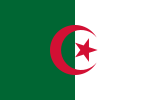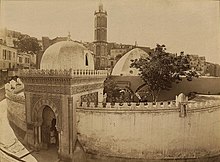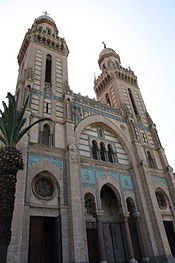Religion in Algeria
Religion in Algeria (2020)[1]
Other religions total <0.1%
| Part of a series on |
| Algerian Islamic reference |
|---|
| Part of a series on the |
| Culture of Algeria |
|---|
 |
| People |
|
Mythology |
|
Art |
Religion in Algeria is dominated by
Islam

Islam, the religion of almost all of the Algerian people, pervades most aspects of life. It provides the
Since the mid-20th-century
Early history
Before the
During the 7th century, Muslims reached
One of the dominant characteristics of Islam in North Africa was the cult of holy men, or maraboutism. Marabouts were believed to have barakah, or divine grace, as reflected in their ability to perform miracles. Recognized as just and spiritual men, marabouts often had extensive followings, locally and regionally. Muslims believed that baraka could be inherited, or that a marabout could confer it on a follower.[8]
The
Islam and the Algerian state
Jews and Christians, are according to the Qur'an recognized as the precursors of Islam and who were called "people of the book" because of their holy scriptures, were permitted to continue their own communal and religious life as long as they recognized the temporal domain of Muslim authorities, paid their taxes, and did not
Soon after arriving in Algeria, the French colonial regime set about undermining traditional Muslim Algerian culture. The French ideas such as freedom of religion, however, vastly differed from the Islamic way of living. For this reason, Islam was a strong element of the resistance movement to the French.[9]
After independence, the Algerian government asserted state control over religious activities for purposes of national consolidation and political control. Islam became the state religion in the new
Those measures, however, did not satisfy everyone. As early as 1964, a militant Islamic movement, called Al Qiyam (values), emerged and became the precursor of the Islamic Salvation Front of the 1990s. Al Qiyam called for a more dominant role for Islam in Algeria's legal and political systems and opposed what it saw as Western practices in the social and cultural life of Algerians.[9] This proved to be the most difficult challenge for the immediate post-independent regimes as they tried to incorporate an Islamic national identity alongside socialist policies. Whereas the new leaders of Algeria saw Islam and Socialism as both compatible and features of Algerian culture and society; radical Islamists saw Islam as the only defining characteristic and in fact incompatible.[10]
The rise of Islamism had a significant impact on Algerian society. More women began wearing the veil, some because they had become more conservative religiously and others because the veil kept them from being harassed on the streets, on campuses, or at work. Islamists also prevented the enactment of a more liberal family code despite pressure from feminist groups and associations.[9]
Religious minorities
Christianity came to North Africa in the

The
The government of Algeria has been known to target the Protestant Church of Algeria (EPA), closing down dozens of churches in three waves since 2008, putting the churches through rigorous processes before allowing then to re-open. This activity included eighteen churches closed between November, 2017 and October, 2019.[12] The United States Commission on International Religious Freedom included Algeria in its 2020 report of the world's most severe religious freedom violators for a number of discriminatory actions, including the fact that, as of the report, 12 EPA churches had not yet been given permission to re-open.[13]
The Baháʼí Faith in Algeria dates from 1952.[14] Though the religion achieved some growth and organization through 1967 including converts,[14] the period of the independence of Algeria when the country adopted Islamic practices in rejection of colonial influences[15] and subsequently the religion was effectively banned in 1968.[16] However, by 2010, the Association of Religion Data Archives estimated the population of Baháʼís in Algeria at 3,300 followers.[6]
The Jewish community of Algeria is of considerable antiquity, with some members claiming descent from immigrants from Palestine at the time of the Romans. The majority are descendants of refugees from Spanish persecution early in the fifteenth century.[17] They numbered about 140,000 before the Algerian War, but at independence in 1962 nearly all of them left the country. Because the 1870 Crémieux Decrees, which aimed at assimilating the colonists of Algeria to France, gave Jews full French citizenship, most members of the Jewish community emigrated to France.[11] The small remaining Jewish population appeared to have stabilized at roughly 1,000. It was thought to be close to this number in the early 1990s. Although no untoward incidents occurred during the Arab-Israeli wars of 1967 and 1973, a group of youths sacked the only remaining synagogue in Algiers in early 1977.[11]
A 2015 study estimates some 380,000 Christian believers from a Muslim background in the country, most of whom subscribe to some form of evangelical Christianity.[18] There is also a small growing Pentecostal and evangelical community.
Religiosity
According to a survey by Arab Barometer for a June 2019 report by BBC News, the percentage of Algerians identifying themselves as non-religious increased from around 8% in 2013 to around 15% in 2018.[19] A follow-up by Arab Barometer, released in December 2019, found that the growth in Algerians identifying themselves as non-religious is driven by young Algerians, with roughly 25% of that specific cohort describing themselves as non-religious.[20]
The Arab Barometer survey reported, of those that responded: 99.1% of Algerians identified as Muslim, 0.4% as Christian, 0.4% as no faith and 0.1% as Jewish.[1]
In 2022, Freedom House rated Algeria's religious freedom as 1 out of 4.[21]
In 2023, the country was ranked as the 9th worst place in the world to be a Christian.[22]
See also
- Christianity in Algeria
- Catholic Church in Algeria
- Religious freedom in Algeria
- Ministry of Religious Affairs (Algeria)
References
- ^ a b "AB Wave V - 2018 | Algeria | Respondents' Personal Information (Demographics) | Religion |". Arab Barometer Data Analysis Tool (Report). Retrieved 2020-10-21.
Muslim 2,299 - Christian 9 - Jewish 2 - No religion 10 - no answer 12 Number surveyed 2,332 Number who responded 2,320
- ^ "Religious Composition by Country, 2010-2050". Pew Research Center.
- ^ a b c d 2018 Report on International Religious Freedom: Algeria. Bureau of Democracy, Human Rights, and Labor (Report). United States Department of State. 2018. Retrieved 2020-05-13.
- ^ "The World Factbook – Africa – Algeria". CIA. Archived from the original on 3 January 2021. Retrieved 3 Jan 2021.
- ^ Hackett, Conrad; Connor, Phillip; Stonawski, Marcin; Skirbekk, Vegard; Potančoková, Michaela; Abel, Guy (2015-04-02). "Religious Composition by Country, 2010 and 2050". The Future of World Religions: Population Growth Projections, 2010-2050 (PDF) (Report). Pew Research Center. p. 234. Retrieved 2020-10-21.
Algeria 2010 Christian: ≈0.2% of 35,470,000 population (≈70,940)
- ^ a b "QuickLists: Most Baha'i (sic) Nations (2010)". Association of Religion Data Archives. 2010. Retrieved 2020-10-20.
- ^ a b Deeb, Mary Jane. "Islam." Algeria (Country Study). Federal Research Division, Library of Congress; Helen Chapan Metz, ed. December 1993. This article incorporates text from this source, which is in the public domain.
- ^ a b c d Deeb, Mary Jane. "Early History." Algeria (Country Study). Federal Research Division, Library of Congress; Helen Chapan Metz, ed. December 1993. This article incorporates text from this source, which is in the public domain.
- ^ a b c d e f Deeb, Mary Jane. "Islam and the Algerian State." Algeria (Country Study). Federal Research Division, Library of Congress; Helen Chapan Metz, ed. December 1993. This article incorporates text from this source, which is in the public domain.
- ^ a b Dr Jonathan N.C. Hill (2006) Identity and instability in postcolonial Algeria, The Journal of North African Studies, 11:1, 1-16, DOI: 10.1080/13629380500409735
- ^ a b c d Deeb, Mary Jane. "Religious minorities" Algeria (Country Study). Federal Research Division, Library of Congress; Helen Chapan Metz, ed. December 1993. This article incorporates text from this source, which is in the public domain.
- ^ Brief: Religious Freedom in Algeria (PDF). International Christian Concern (Report). April 2020. Retrieved 2020-05-13.
- ^ "Algeria: USCIRF–RECOMMENDED FOR SPECIAL WATCH LIST" (PDF). Annual Report 2020. United States Commission on International Religious Freedom (Report). 2020-04-28. Retrieved 2020-10-21.
In 2019, USCIRF met with EPA leadership, who reported that 12 of their member churches remained closed by authorities at the end of the reporting period.
- ^ a b Hassall, Graham (2000). "Algeria". In Winters, Jonah (ed.). Baháʼí Communities by Country: Research Notes (Report). Baháʼí Online Library. Retrieved 2020-10-20.
- ISBN 978-0-521-85649-2.
- OL 715496M.
- )
- ^ Johnstone, Patrick; Miller, Duane Alexander (2015). "Believers in Christ from a Muslim Background: A Global Census". IJRR. 11 (10): 1–19. Retrieved 30 October 2015.
- ^ "The Arab world in seven charts: Are Arabs turning their backs on religion?". Arab Barometer, BBC News. 2019-06-23. Retrieved 2020-10-21.
- ^ "Young Arabs are Changing their Beliefs and Perceptions: New Survey". Fanack. 2019-12-31. Retrieved 2020-10-21.
- ^ Freedom House, Retrieved 2023-04-25
- ^ Open Doors website, retrieved 2023-08-28


